|
This morning I started my pies. You probably know why. Tomorrow is Thanksgiving and there is lots to do. We have hosted for years and--as the primary-but-no-longer-sole cook--I have a system. With certain exceptions, the preparation for the meal goes in reverse order of consumption, which means desert first. Anyway, my son--who will be ultimately responsible for this dish--brought home a splendid butternut squash and some sweet potatoes from the farm where he works. My task this morning was to reduce them to a puree for later assembly. I have the Christmas music on. It's somebody's attempt to reconstruct the Grant's Department Store albums on Spotify. I am mindful of the peeling and the roasting. I am making a list of things we forgot to get in the first (and second and third) run to the grocery store. Johnny Mathis is singing O Holy Night. I am inhabiting the holidays...yet I am also not. I am not entirely feeling festive this year. You see, it is a dark time in the world and it seems weird in some way to be grateful when so much is going to Hell in a hand basket. The holidays are like that. Even in times that seem somewhat better than this one, there is conflict. There is pain. There is the fact that not everything works out the way we would hope. Thanksgiving was the big holiday in my family of origin. It is built into me to be a "Thanksgiving person" like some are "Christmas People" or Halloween people". It is my personal high holy day, regardless of the ambiguity. It was also something we faced with seriousness and intention every year. Christmas and other holidays were an afterthought compared to Thanksgiving. There certainly was a good way to celebrate it which, of course, was our way. As a child visiting my grandparents, every year the various activities were exactly the same as the year before. My grandfather, who fought in the Second World War and spent two years in a German prison camp, made sure that it all went off with precision. The morning started with farm-chores. Then there was the obligatory family football game. Then we would get all dressed up--we boys wore blazers and ties--and filed into the large dining room that was only used for special days. Then we would sit in our assigned seats. Each seat was the same each year unless a new addition set the chart in disarray. The food...it was the same to. There was never a variation to the menu, from the enormous turkey that my aunt and mother would cook to the tomato aspic they let my grandmother prepare so that she would stay out of the way. It was–-and still is…if somewhat reformed–-a ritualistic day leading toward a ritual meal. It is, for many people, like a Communion Sunday at church. Like at church, there is an element of worshipfulness. There is the air of the sacred though we may not know why. Nan Merrill, who is one of my favorite liturgical poets, writes in her Mandalas and Meditations, "Who will open their hearts to the/blessings of love? Who will surrender their lives/to be guided by the spirit? Who will invite the Most Holy into/the heart's abode? These are the sorts of question we ask ourselves, or we are encouraged to ask during this season. Regardless of what holiday floats our boat, when the moment comes, we try to turn away from our regular tasks and challenges. Our goal is to love and be loved; to let in "the Divine" whatever that means to us. Of course, when we look up from our mundane activities, we don't really let them go entirely. We are human beings, and we make sense of our world through stories. Some of these stories are small and personal. Others are set in the larger context of society or the environment. However, each story comes with its ups and downs. Each story comes with risks. The reason is simple. Stories have different interpretations and different points of view, so conflict is inevitable for most of us during this time. The classic is the Thanksgiving table battle with Uncle Bert or whatever. Realistically, it can happen at any time when we are trying so hard to get along. In fact, when I look back fondly on those childhood holidays with my grandparents, I wonder if their regimented nature had something to do with those differences of opinion. Time, distance, and marriage had set every faction in our extended family on different trajectories. My funky northern liberal parents didn't always strike the right chord as some of the more staid and conservative--and also beloved--relations. The same could be said going the other way. Again, we were trying but sometimes we were also trying if you get my drift. Now, my family is not atypical. These experiences of real conflict and tension tempt us every year. After all, everyone knows what is going on as we gather around the table. This year there are wars in Ukraine and the middle east that have generated strong opinions and feelings. They have had repercussions for many people at home with the rise of antisemitism and hatred of Muslims. There is hunger and fear outside the walls of our relatively tidy holiday-houses as well. The gap between rich and poor grows. Our own democratic institutions seem weaker than at any time in our memory. There are a plethora of personal battles being fought within each of us every day. In other words, there are storms brewing. We shouldn’t be surprised when the chaos slips on into our carefully created rituals of the season. Which means that each year we attempt to hold these things--the good and the bad--in tension. At least we should do this, in our own way. Otherwise our gratitude is empty. There is darkness that needs acknowledgement for Thanksgiving to make any sense. When we think of a time where gratitude abounds, we consider the unambiguously happy moments, like weddings. However, we also think of funerals. I have officiated a number of them lately. There by the graveside we struggle to hold on to a memory. Still, we also tell a story of gratitude in the midst of sadness and unfinished business. It is in these moments where we hold things in the balance. It is in these moments when we are being the most authentic humans we can be. Now, there is actually a way to celebrate what we have and to mourn what is missing at the same time. It takes courage, like so many things, but it's worth trying. An act of thanks in a time of oppression and evil--in a time of crises and conflict--is an act of resistance. It is a moment where we contemplate the vastness and decide that "the Man"--those principalities and powers of our society--isn't going to get us this time. We are stating that in the midst of struggles--whatever they may be--we will be broad-minded and open-hearted against the forces of fearful self-interest.
There is strength in looking at the vastness. There is strength in prayer, which is really what we are talking about. There is strength in understanding our role as part of the ecosystem writ large. This practice encourages us to set aside our own issues. Nan Merrill's translation of Psalm 146 tell us to "Put not your trust in riches, in illusory things that fade away. For when our day comes to depart this world, at that very time, we carry only the love imprinted on our soul." That is what all this holiday-making--all this risk taking--is about. Or, at least, that is the goal. It requires some practice. It also requires some higher order thinking to say “yes, I am grateful…but”. We are grateful but…not all is right in the world. Not all is right in our lives. We are grateful but…when we look over this broken earth, the blessings are imbalanced. Though we may be pleased with what we have, we see that there is work to be done. This “yes, but” is as much a “yes and” approach familiar to anyone who has ever done improv. For in our gratitude, we are motivated to action. This is an essential element of the move, actually. So many people want to escape during the holidays. So many center their own narrative and miss the opportunity to reach out. Thanksgiving in particular is susceptible to this. As is perhaps inevitable in a secular holiday with a religious theme, our “attitude of gratitude” has too often been an act of self-congratulation masquerading as humility. For example, as children we learned the holiday’s creation myth--all that stuff about the Pilgrims and the Native-Americans gathering together in peace--as history. At best it is a white-washed mashup of complex events in the midst of a clash of cultures. That “First Thanksgiving” myth was--and still is--used to prop a distinctly American theology. It is used to privilege and elevate the story of European Americans and legitimate colonialism in the so-called “New” World. Now, theoretically, we know better. Still, we feel the impact of this story and of how we learned it every day. Here is another example. It is also hard not to veer into self-congratulation in a celebration of the ability to lay out a table of more food than we can eat. When we do this, we are celebrating our riches in gratitude for a harvest that we did not bring about. We celebrate our ability to store up food for a winter that–thanks to the trappings of our suburban society–will not be a time of scarcity for most of us, after all. We don’t want to be like that. We also know that we don’t have to be. There is a way--through honest prayer--to be grateful and still acknowledge the depth of pain in the world, in our bodies, and in our hearts. There is a way to atone, somewhat, and commit to the struggle. There is a way to bring about a better life and a better world that we can celebrate next holiday season. Every year I share a prayer by Theodore Parker with the church. It is called "Trials". It may not be the best prayer ever–At least artistically–but it is an authentic one. Parker was a transcendentalist, and a Unitarian minister who was ostracized by his fellow Unitarian clergy because of his radicalism. He had personal struggles, too. Many of those struggles had to do with his health. He died young at 50 years of age, right before the Civil War. In this prayer he mixed his gratefulness with the reality of his situation, facing imperfection and acknowledging responsibility. In it he speaks into where he feels he has failed. He notes the suffering he has endured but…he still ends in thanks. He still finds reasons for gratitude. For all the trials of my earlier day I thank thee that they all have been That darkness lay about the rugged way Which I must tread alone. For all I’ve seen Of disappointment, sorrow, pain, and loss I thank thee for them all. And did I sin, I grieve not I’ve been tried; for e’en the cross Of penitience has taught me how to win. Yet of ills as child or man I’ve borne-- My hopes laid waste, or friends sent off by death,-- Remorse has most of all my boson torn For time misspent ill deeds or evil breath. But yet, for every grief my heart has worn, God I thank thee still, trusting with a hearty faith. So that is where we are this year. In a world of trouble and pain. We live in a world in need of our humility and our strength. We live in a world in need of our joy and our gratitude. We need to give these things even in the face of all that has happened and all that will happen in the quest for the just and peaceful Kin-dom. Today, I am done with the squash. I have the turducken almost thawed out. I am making plans in future days to eat both of these dishes and more besides until they are gone. We will not wear ties to dinner tomorrow. Things will be more casual. Maybe--for a little while--we might talk about religion and politics until we can't deal anymore. Then next week, having been grateful for the many things we should be grateful for and having acknowledged the hard truths--or as many as we can--we will turn back to the dream of making a better world. After all, we will have Advent to remind us, right? May we see the imperfect world and resist despair by giving thanks for the victories, the love, and the tools for the new journey that empower us to good work and enable us to move forward once again.
0 Comments
I may be posting a bit more about music and other things for a while. It is hunting season here in New England, so my hiking has been limited to suburban trails. They are pretty of course. They may not really be post-worthy, however. I do stay away from many of the wilder places during this time, particularly during the week. Some hunter has taken time off from work on a weekday to head on out to do their thing. They shouldn't have to worry about me or I about them. The season will end soon enough, and the winter climbs can begin. Also, I am swamped at work. The holidays are here. The church is down both an intern/assistant minister and a church administrator. It is just me right now. There is so very much to do. Among the things to do, though, is plan for holiday music. The Liturgical Folk Band has been busy playing for our experimental "Second Sunday" services. In fact, as we tweak the format in other ways, I would say the band has been a point of stability for us. That hasn't always been the case in the past, so it is nice. 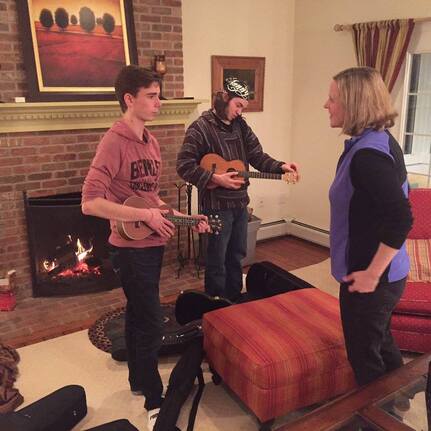 Turns out we play after the work of the day is done. So many of the pics and vids are in the dark Turns out we play after the work of the day is done. So many of the pics and vids are in the dark I have written about folk music in the church before, so my plan here was to keep it brief and leave you with some links at the end. I failed. I just want to comment for a moment on the folk element of the term. Folk Music is what folks do. In an often-professionalized world we have grown accustomed to leaving to professionals things that have for the vast majority of human existence been something that is done by amateurs. Music is only one example of this. Even in the genre we are discussing, a "folksinger" is more often than not somebody we pay. We go see them in cozy concert halls, or we buy their music. The performance is (hopefully) of a monetizable quality. Interestingly enough, many professional musicians are trying to leave the term "folk" to the amateurs. Some performers of original works now lean toward "singer-songwriter" for what they do. Performers of actual folk tend toward the terms "Old Time" or "World Music" to describe what they do. That is nice of them. They at least recognize that part of their job is to popularize works that others can replicate at home. That is, they are empowering people to keep on doing folk-art. 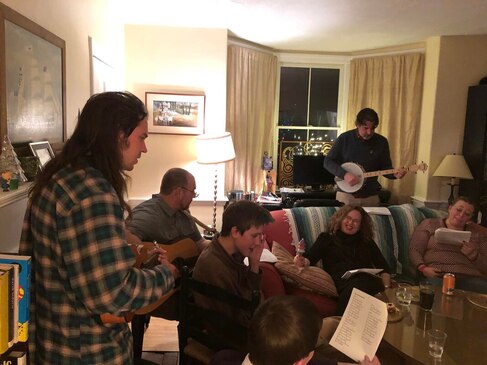 I bring this up because being just OK at something doesn't mean we cannot enjoy doing it. It doesn't mean we cannot share it either. If we just relied on professional athletes, there wouldn't be pickup basketball. If we just relied on professional artists, then we wouldn't have the rich world of creativity that we need for our culture to thrive. When you see videos of us playing, I want you to understand that we know how good--or not good--we are. The point is that everyone has a place to create. So...what do you do if you would like to take your place as one of the folk in folk music? All you have to do is find an instrument and make some noise. If you want a little more direction, here are some thoughts.... Start with What You Used to Play! This should be obvious but somehow it isn't always. There are no rules for what an actual folk musician can play. Yes, the acoustic guitar is ubiquitous among the professionals. However, that has to do with what is marketable. You aren't shooting for a recording contract. You don't care what "the Man" thinks about your music! Did you play clarinet and you still have it? That works. The trick is just to find ways to be creative with it when you are playing with others. That takes time, but it should be fun time. Start with What might be fun! What instrument did you always think sounded cool? That is a good place to start. Think about what sort of sound you think you could make. What sound would you like to make? Pick Something You Will Stick To! For some people that will an instrument that is easy to get going on but hard to get good on, like the ukulele or the autoharp. For others it may be something that is hard to get started on but you get progressively better over time. You have to want to practice. However, remember that in amateur folk music practice isn't so much practice as "jamming-with-yourself". You should enjoy it. Remember to measure success not by how proficient you are but by how much fun you are having. Pick Something Different! OK, say you want to play with people and this is your big goal. If this is the case then I want to say something that might be considered controversial in some quarters. Pick an instrument that other people don't play. Over the last half-century, the go-to instrument has been guitar. Whay has this been the case? Take a look at my previous suggestions. People frequently play guitar as a kid. Parents like the idea and pay for lessons. It replicates the sound of a ton of great music performed by professional musicians and released to a breathless public. Finally, with a few quick chords, you can play along to almost anything. However, because of this, if you want to get your pals together to jam you will have no shortage of three-chord guitar warriors keeping the beat. Most of them will be thinking about how much cooler they would sound with a little variety. This is where you come in. How about something that sounds different? I play guitar but when I get together to play with people nobody has ever asked me to play it. The reason is there are already plenty of guitars in the lineup. Instead, they ask if I could play some other instrument. 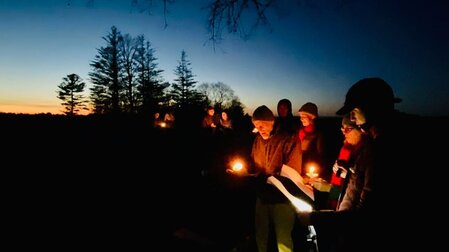 Here are the ones I play: Voice, Mandolin, Ukulele, Tenor Banjo, Bones. Here are some I always wish somebody else would play: Bass, Autoharp, 5-String Banjo, Drums, Whistles, Fiddle Anyway, knock yourself out. There is a learning curve to these instruments just like guitar. Also, as you learn, you will be noticeable. Still, you shouldn't worry about mistakes. My experience is that all the guitar players are just happy you are there. OK, that is it. My music update plus some stuff. Enjoy the vids. Here is the link to the "Music and Arts" section which--as I mentioned--should be growing over the winter. I spent a couple hours today cleaning out the church office. I organize in piles. I like to be able to lay eyes on all my stuff--papers, liturgical gear, easels and so on--so I know where everything is, and I do not forget certain items exist. My favorite tool in this way is a bookshelf. The titles are on the spine. After a period of repeated use, I know the color and size of each book well enough that I don't need categories to find them again. An open shelf is a horizonal pile. I love them.
However, this piling doesn't work quite as easily at work. There just aren't enough shelves. Also, I am not one of those ministers with a spacious private office to retreat to. I have a desk in the corner of the shared workspace, but I haven't sat at it since before the pandemic. The way we work has changed. The church office is no longer a buzz of activity. Over time, piles--vertical ones--have taken over the desk. In this case they were piles I didn't really need. Anyway, I got to cleaning my desk along with the stacks on the floor and the other two desks that share the space. One of the desks is for an intern if we ever have one again. The other is for a church administrator. After the departure of our beloved admin Felicia, we need a new one of those as well. Since it has just been me in the office--along with drop-ins from lay leaders--all surfaces are about the piles. Cleaning isn't easy for me. As I went through the stacks of paper, I found references to old ministries that are no more. We used to have an active youth group. We had a D&D group for kids. We had multiple Christmas Eve services, plays-in-worship, fall fairs, rummage sales, and casual hangouts after worship at a local bar. Some of these things are long gone. Some need attention and could be revived. In any case they are memories. I greet them with panic, nostalgia, and sometimes regret. Most of the regret, though, is saved for failures. Not all programs had long runs we can look back on with pleasure. There are as many false starts in the piles. Usually, they are things I thought might have potential. However, they fizzled out. Usually there was a marked lack of energy or interest. I don't blame others, but I do blame myself sometimes. I ask myself if Maybe I pitched it in a different way I could somehow have made them more compelling. At home the attic and the basement are filled with things like this. There are plenty of problematic reminders. When I survey the boxes in the corners of the house, I see happy things...sometimes. However, most happy things aren't shoved away from sight. Just as often I see signs of old failures, conflicts, and dark times. We carry that stuff around, particularly when others see the same moment in a more positive light. I ask myself if this is this the day I rent the dumpster and start chucking things out. Maybe it is just another day I can't deal. I know of plenty of people who say they aren't like this. They claim to move through life without attachments. Memories and garbage are in the past and they are unaffected or forgetful. Good for them, I guess. When I walk through life, I know there are many paths we can take. We hit the crossroads and we pick our way through the choices. Sometimes we luck out and sometimes we do not. Just as in any walk, the path can be hard. The goals can be elusive or disappointing. Yes, the story of the struggle and what we learned may give us strength for the next journey. That said, things may have sucked and we have the right to remember that as well. Perhaps others don't wonder about the roads we turned from, but I do. Just maybe you do, too. In our lives we pick things up, or they stick to us. We can reach our destination covered in common burdocks or--even worse--ticks. Maybe you know the stress of old detritus. We carry it farther than we should. So back to the cleaning, if we can manage it. In the fall I think of the rebirths to come in the spring. That potential rebirth drives us to go through the piles. We need to prepare the ground for the next crop. A clear desk gets us on to the next job. Man, though, it is work, isn't it? We don't just become a new person. We don't just rise one day clean and unburdened. Before the resurrection there is a bottleneck, we must find a way to squeeze through. If you are doing this work, I see you. I hope you have someone helping you carry the load. There are moments when we need someone or something to give us a push or a yank. I sat at my desk today and looked out the window for the first time in a long time. It was nice to bask in the November light for a moment, watch the traffic go by, drink my coffee, and read an old copy of the Christmas Pageant from long ago. Maybe there are some good dreams in the future. Maybe there is more cleaning to do before Advent. Maybe there will be emptying in winter to make room for something new. Maybe we lay down some burdens for the new thing. We shall see. I hope you all fill your dumpster this year. Let's make a pact to get the garbage out. Cleaning is tough work to do by yourself. |
Adam Tierney-EliotI am a full-time pastor in a small, progressive church in Massachusetts. This blog is about the non-church things I do to find spiritual sustenance. Archives
June 2024
Categories
All
|
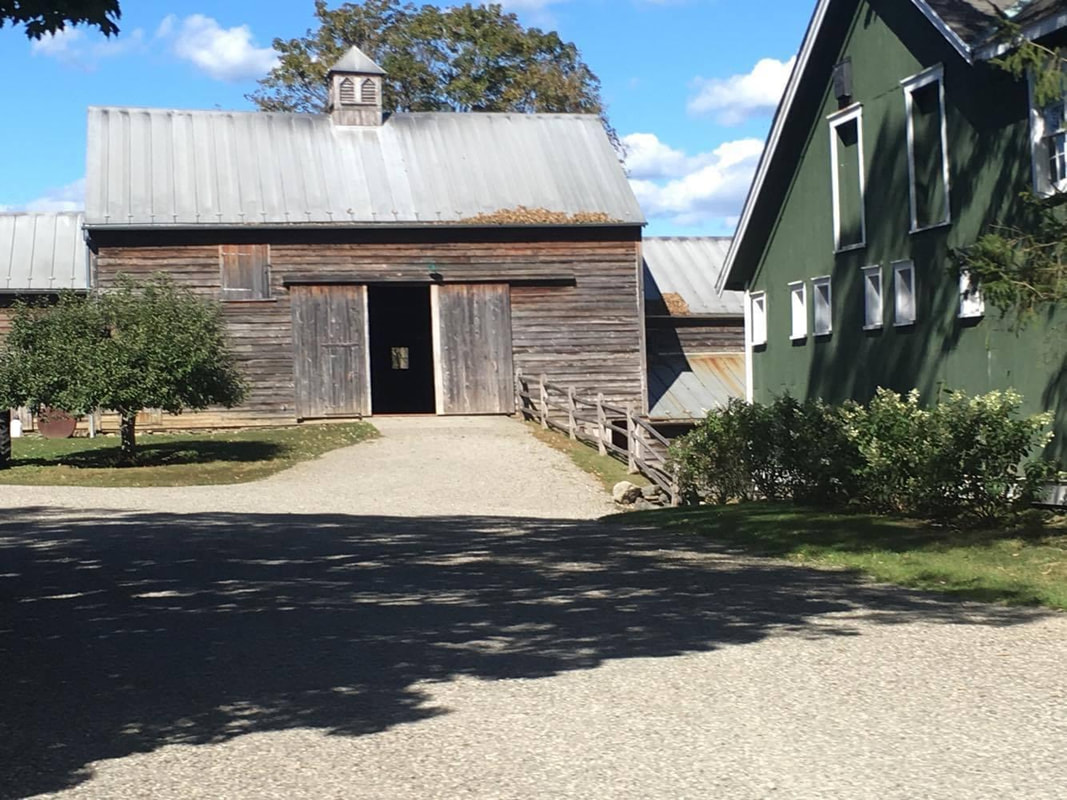
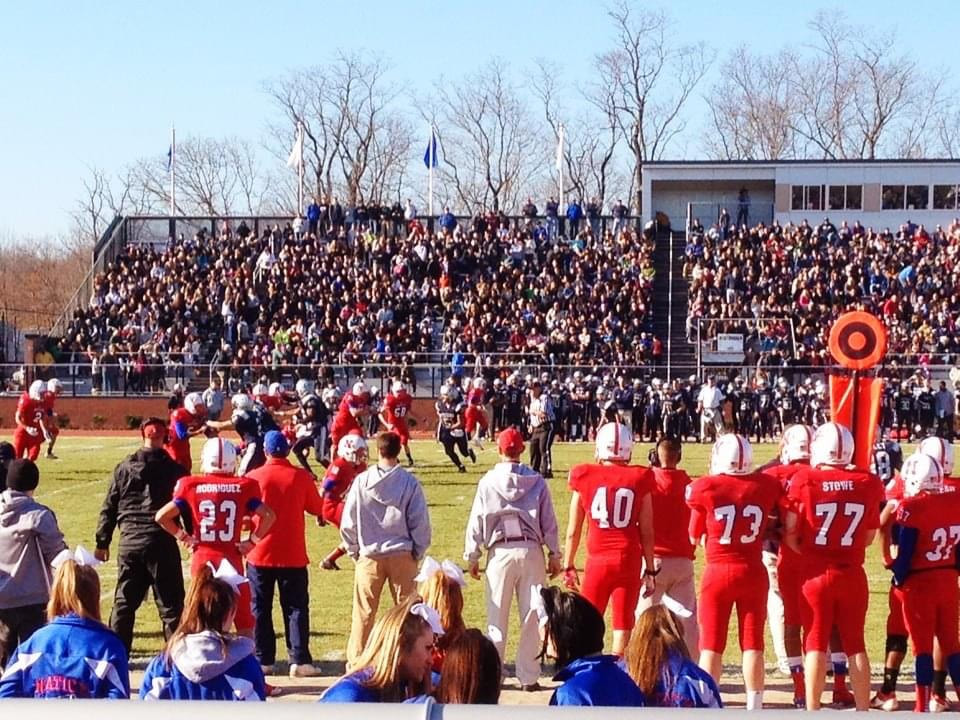
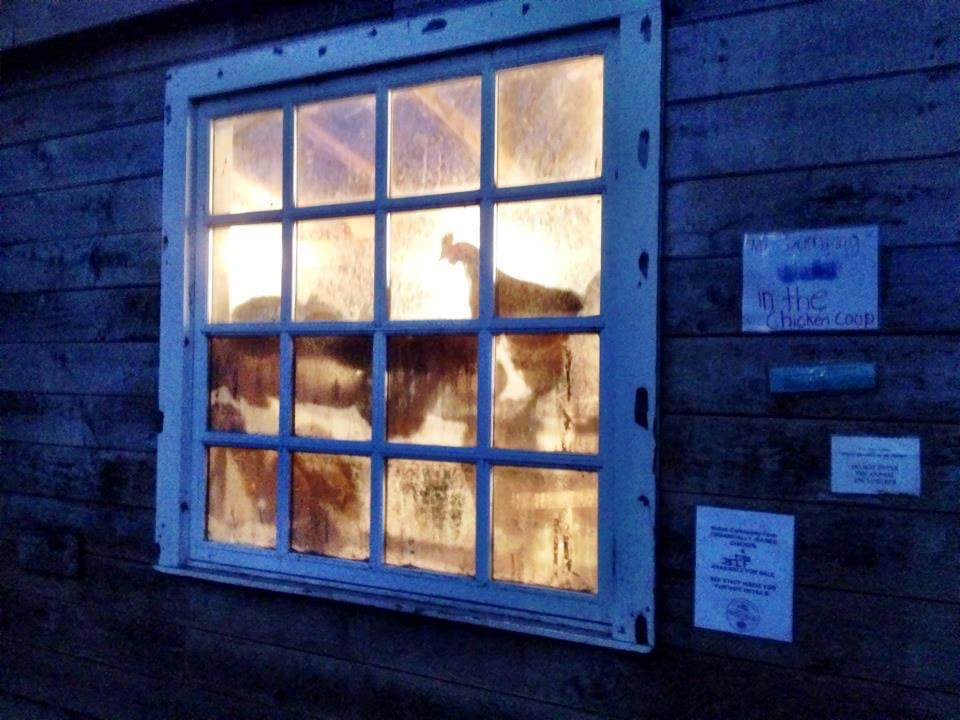
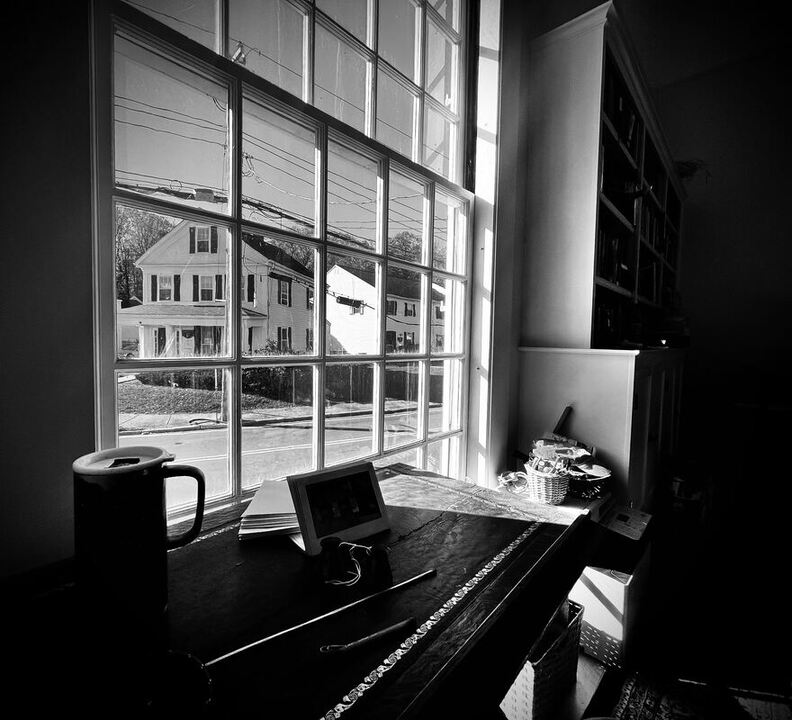
 RSS Feed
RSS Feed